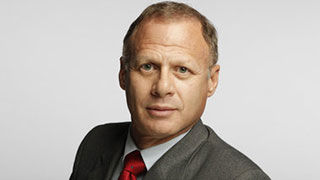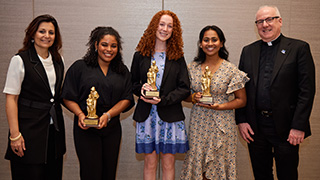The Great Mind Behind the Negotiations
Monday, February 17, 2020

Each workshop is led by Lee E. Miller, professor of management in the Stillman School of Business and a consultant, executive/career coach and corporate trainer in the fields of leadership, influencing and negotiating. He is the co-author of the critically acclaimed A Woman's Guide to Successful Negotiating, which was selected by the Huffington Post as one of the "16 Books Aspiring Woman Leaders Need to be Reading." His other book, Up Influence, Power and the U Perspective: The Art of Getting What You Want, was reviewed recently by Forbes.com, noting the intersection of "Convince, Collaborate and Create" as a powerful framework.
Miller recently shared a little about his background in negotiation and the achievements that can result from learning how to do it effectively.
At what point in your life/career did you realize you had a knack for, and a keen
interest in, the art of persuasion?
I took a course in negotiating at law school, but it wasn’t until I had spent several
years as a lawyer and then as a corporate executive that I realized that influencing
and negotiating were the most important skills you needed to be successful. It wasn’t
so much that I had a knack for it, but rather that I went about learning how to become
better negotiator and in the process developed a methodology to teach others to become
better negotiators as well.
How have you used your negotiation skills to get to where you are today in your career?
Influencing and negotiating skills enabled me to be successful as a lawyer and as
a business executive. They are critical to getting support for your ideas, resources
for your projects and to position yourself to get promoted when the opportunity arises.
What would you say was your proudest moment as a negotiator?
I have been involved in a lot of important negotiations: labor negotiations, employment
negotiations, negotiations to build a hospital in the Middle East and even training
diplomats at the United Nations to be more effective negotiators. However, I am particularly
proud of my first book deal with McGraw Hill to publish Get More Money On Your Net Job… In any Economy. As an unknown author without an agent, I was able to convince them to sign a contract
with an advance and a larger than usual commission based on one chapter and an outline.
Is there a well-known figure from history, politics, etc., who you feel is/was a particularly
successful negotiator? What makes/made this person so effective?
Ronald Reagan is the only union official ever to be elected president of the United
States. He was elected president of the Screen Actors Guild seven times, and as a
result, he probably had more real life negotiating experience than any president before
him. As president of the Screen Actors Guild, he was responsible for actors getting
residuals on television and film productions. He owed much of his success as president
of the United States to his negotiating skills, whether ending the Cold War or passing
an historic overhaul of the tax code, to dramatically lowering marginal tax rates
despite Democratic control of Congress.
Can you think of a moment when someone approached you and credited you for helping
them to move ahead in their job/career?
I once helped a bank president move to a much larger bank and double his salary by
advising him to refuse to share his current salary and simply insisting that the potential
employer give him their best offer. Had he disclosed his salary, not only would he
have not been able to negotiate such a large increase, but the relatively low level
of his salary might have caused the prospective employer to reconsider his suitability
for the position.
What would you say is a common mistake you see many people make when they try to negotiate
salary?
The most common mistakes people make in negotiating salary are not asking at the right
time, not asking in the right way, only focusing on money and not asking for enough.
It’s also usually easier to position yourself to get a promotion, and people often
fail to strategically pursue that option.
What is the single most important piece of advice you could give to anyone looking
to improve their negotiation skills?
Read books on the topic, take a course on negotiating and practice. No one is born
a great negotiator. Everyone has to learn how, and everyone can learn to be a better
negotiator.
Categories: Arts and Culture, Campus Life





